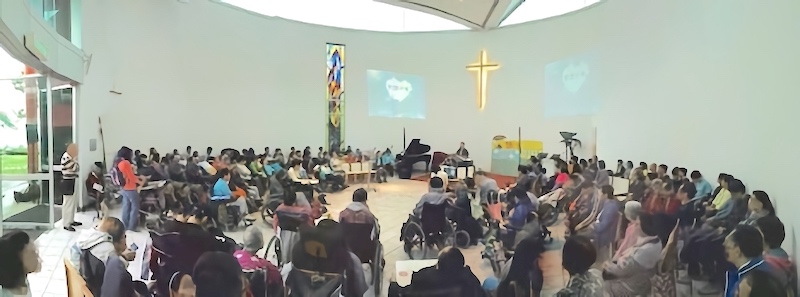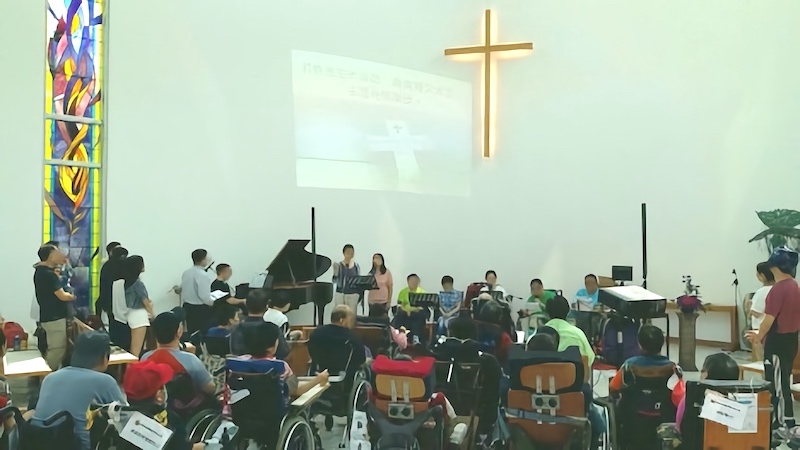Externship project — The experience of spiritual participation among people with intellectual disabilities in an evangelical church in Hong Kong
September 15, 2021
by Global Initiatives Team
Diversity Externships International
By Rebecca Ka Ki Tam
Post-Professional Master’s student
This externship project was inspired by the concept of occupational justice. I worked as a pediatric occupational therapist in preschool settings in Hong Kong before studying at USC. During those days, I had little knowledge about occupational justice. My studies at USC have expanded my understanding of occupational justice and greatly inspired my belief that occupational therapists can advocate for everyone’s right to participate in everyday occupations regardless of age, ability, gender, social class, or other differences (American Occupational Therapy Association, 2020; Nilsson & Townsend, 2010, p. 58). This concept has allowed me to reflect on my experience volunteering in a church in Hong Kong that pioneered spiritual participation among people with intellectual disabilities (ID). I experienced the joy among people with intellectual disabilities in their Sunday services. I wondered, however, whether spirituality is vital to their well-being. This population is one of the most controversial populations to serve in churches since many people believe that individuals with ID cannot fully understand the concept of faith. Thus, I became curious to know more about spirituality in this population — what is their experience in this occupation? How important is faith among people with ID? As revealed in my full article, I started this externship project to explore spiritual participation among people with intellectual disabilities. I conducted interviews in a church that pioneered spiritual participation among people with intellectual disabilities in Hong Kong. I interviewed a participant with severe ID, the participant’s caregiver, a volunteer, and two pastors. I also interviewed Professor Sarah Shea, who is involved in research relating to practical theology and theologies of disabilities and who ministered to marginalized populations at Hong Kong Baptist Theological Seminary.

Participants were participating a Sunday Service in an evangelical church that pioneered the facilitation of spiritual participation among people with intellectual disabilities in Hong Kong
One memorable experience during this project was my interview with Anna (pseudonym), who has a severe ID. During the interview, she prayed for me, sang me a gospel song, and joyfully asked me to accompany her to church. Anna revealed how much she loves church life. I was very touched by her warm welcome and explicit love. Her caregiver shared with me that spiritual activities were unique in that they have helped Anna understand more about life and death, and overcome loneliness.
Anna initially was not comfortable talking to me during the interview. At first, she frequently walked away and ignored my questions. I then tried to talk in simple sentences and treated her as a friend. She gradually became more relaxed, sat down, and chatted with me. It reminded me of a pastor’s sharing that it is always important to be “present” — “Take your time, no rush. Be there with them, despite their circumstances, and treat them genuinely as true friends.”
In this project, I further reflected on how the arbitrary binary of “typical” or “atypical” classifications has inevitably become a barrier to genuine communication. Despite differences, we can always treat each other as true friends, learn from each other, and accept support and help from each other. I used to have a misconception that people with different intelligence might have different needs. Thus, it might be suitable to segregate people into various groups according to their needs. However, I realized this misconception was a barrier that had obstructed my genuine interaction and friendship with people diagnosed with intellectual disability. There should not be hierarchies in interaction, but we should celebrate our diversity. In an interview, a pastor shared that occupational justice probably does not merely focus on enabling people to participate in a particular occupation but also emphasizes the meaningful interaction among different people within that context. I envision that the concept of occupational justice will be more widespread someday, and I hope this article will motivate the public to advocate for occupational justice among people with intellectual disabilities.

Participants, no matter with disabilities or not, were leading worship
References
American Occupational Therapy Association. (2020). Occupational therapy practice framework: Domain and process (4th ed.). American Journal of Occupational Therapy, 68(Suppl. 1). S1-S48.
Nilsson, I., & Townsend, E. (2010). Occupational justice — Bridging theory and practice. Scandinavian Journal of Occupational Therapy, 17, 57–63. https://doi.org/10.3109/11038120903287182
Tam, R. K. K. (2021, July 15). The experience of spiritual participation among people with intellectual disabilities in an evangelical church in Hong Kong
⋯
Next by tag Diversity ⟩ Externships ⟩ International ⟩
⋯





